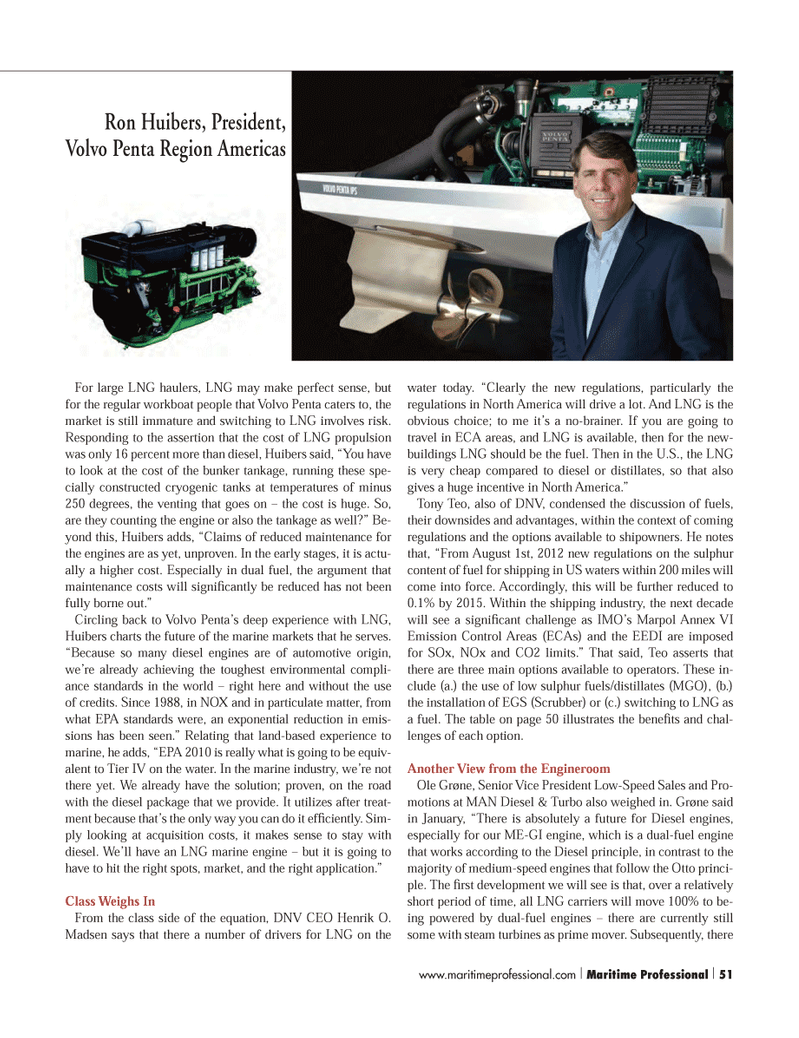
Page 51: of Maritime Logistics Professional Magazine (Q1 2013)
Maritime Risk
Read this page in Pdf, Flash or Html5 edition of Q1 2013 Maritime Logistics Professional Magazine
For large LNG haulers, LNG may make perfect sense, but for the regular workboat people that Volvo Penta caters to, the market is still immature and switching to LNG involves risk. Responding to the assertion that the cost of LNG propulsion was only 16 percent more than diesel, Huibers said, ?You have to look at the cost of the bunker tankage, running these spe- cially constructed cryogenic tanks at temperatures of minus 250 degrees, the venting that goes on ? the cost is huge. So, are they counting the engine or also the tankage as well?? Be- yond this, Huibers adds, ?Claims of reduced maintenance for the engines are as yet, unproven. In the early stages, it is actu- ally a higher cost. Especially in dual fuel, the argument that maintenance costs will signi cantly be reduced has not been fully borne out.? Circling back to Volvo Penta?s deep experience with LNG, Huibers charts the future of the marine markets that he serves. ?Because so many diesel engines are of automotive origin, we?re already achieving the toughest environmental compli- ance standards in the world ? right here and without the use of credits. Since 1988, in NOX and in particulate matter, from what EPA standards were, an exponential reduction in emis- sions has been seen.? Relating that land-based experience to marine, he adds, ?EPA 2010 is really what is going to be equiv- alent to Tier IV on the water. In the marine industry, we?re not there yet. We already have the solution; proven, on the road with the diesel package that we provide. It utilizes after treat- ment because that?s the only way you can do it ef ciently. Sim- ply looking at acquisition costs, it makes sense to stay with diesel. We?ll have an LNG marine engine ? but it is going to have to hit the right spots, market, and the right application.? Class Weighs In From the class side of the equation, DNV CEO Henrik O. Madsen says that there a number of drivers for LNG on the water today. ?Clearly the new regulations, particularly the regulations in North America will drive a lot. And LNG is the obvious choice; to me it?s a no-brainer. If you are going to travel in ECA areas, and LNG is available, then for the new- buildings LNG should be the fuel. Then in the U.S., the LNG is very cheap compared to diesel or distillates, so that also gives a huge incentive in North America.? Tony Teo, also of DNV, condensed the discussion of fuels, their downsides and advantages, within the context of coming regulations and the options available to shipowners. He notes that, ?From August 1st, 2012 new regulations on the sulphur content of fuel for shipping in US waters within 200 miles will come into force. Accordingly, this will be further reduced to 0.1% by 2015. Within the shipping industry, the next decade will see a signi cant challenge as IMO?s Marpol Annex VI Emission Control Areas (ECAs) and the EEDI are imposed for SOx, NOx and CO2 limits.? That said, Teo asserts that there are three main options available to operators. These in- clude (a.) the use of low sulphur fuels/distillates (MGO), (b.) the installation of EGS (Scrubber) or (c.) switching to LNG as a fuel. The table on page 50 illustrates the bene ts and chal- lenges of each option.Another View from the Engineroom Ole Grøne, Senior Vice President Low-Speed Sales and Pro- motions at MAN Diesel & Turbo also weighed in. Grøne said in January, ?There is absolutely a future for Diesel engines, especially for our ME-GI engine, which is a dual-fuel engine that works according to the Diesel principle, in contrast to the majority of medium-speed engines that follow the Otto princi- ple. The rst development we will see is that, over a relatively short period of time, all LNG carriers will move 100% to be- ing powered by dual-fuel engines ? there are currently still some with steam turbines as prime mover. Subsequently, there Ron Huibers, President, Volvo Penta Region Americas www.maritimeprofessional.com | Maritime Professional | 51MP #4 50-63.indd 51MP #4 50-63.indd 512/25/2013 10:01:32 AM2/25/2013 10:01:32 AM

 50
50

 52
52
